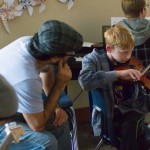 Research: In 1933 John Dewey wrote that teachers must “give full time and attention to observation and interpretation of the pupils’ intellectual reactions.” What he was referring to is now termed “presence.” Research shows that learning is bound to essential, authentic relationships where teachers are present with their students, paying close attention to their needs, and responding intelligently and compassionately to them. Presence is a major component of prompting participation in the learning experience and positive educational outcomes.
Research: In 1933 John Dewey wrote that teachers must “give full time and attention to observation and interpretation of the pupils’ intellectual reactions.” What he was referring to is now termed “presence.” Research shows that learning is bound to essential, authentic relationships where teachers are present with their students, paying close attention to their needs, and responding intelligently and compassionately to them. Presence is a major component of prompting participation in the learning experience and positive educational outcomes.Practice: At Chrysalis we recognize the power of presence—it build the critical foundation for learning and can contribute to a transformational experience for students. All of our students receive one-on-one instruction in some form, providing hours of adult presence in their days. They feel seen and heard by teachers who strive to constantly balance the right amount of challenge with support to create and optimal learning environment. Click here for tips on how to practice being present at home.